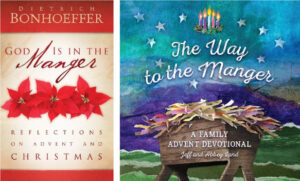
The church season of Advent begins this Sunday.
Advent is our opportunity to live in the tension between God’s presence and absence. It’s a celebration of a past event and an anticipation of a future one. It’s disappointment at the world’s darkness and hope for its light. It’s a season of preparing for something else, but also its own story. We live between disappointment and hope, waiting and working, trusting in the grace of God which is present and coming to us again in Jesus Christ. Karl Barth said “What other time or season can or will the Church ever have but that of Advent!”

This year, First Presbyterian Church invites you into the preparation: to sit in the darkness at the end of the year a bit longer, in order to prepare for the light. We invite the adults of our church to join us in the devotional reflections of the German Theologian Dietrich Bonhoeffer in, God is in the Manger. And we invite families with young children to join in The Way to the Manger, by Jeff and Abbey Land. Bonhoeffer’s claim that we celebrate the season in “the ruins” is a promise—that no matter where we are in life or in our preparations for Christmas, God’s grace will be waiting for us just there: a light shining in darkness. You are welcome to take one of these devotional resources from the commons this coming Sunday, November 28 before or after worship.
God bless you in your preparing, your waiting, and in your receiving.
An excerpt from the Companion to the Book of Common Worship (Geneva Press, 2003, 96):
In Advent we expectantly wait for the One who has already come. We anticipate the promised justice of God’s new world, yet we praise God who raised the “righteous branch” to rule with justice and righteousness. We hope for the restoration of the afflicted, the tormented, and the grieving, yet we delight that healing has come in Christ. We long for the beating of swords into plowshares, yet we rejoice that the Prince of Peace has appeared. We yearn for the barren deserts of our inner cities to flourish, yet we laud the desert Rose that has bloomed. We dream of the land where lions and lambs live in harmony, yet we acclaim the child born to lead us into the promised land.
Christ has come! Christ is risen! Christ will come again! In Advent, we are living between the first and the second coming of the Lord. The dialectical tension of maranatha [alternately translated “Come, our Lord!” or “Our Lord has come”] — placing us between memory and hope, past and future — may strengthen our Advent liturgies. Perhaps we need to cling to the ancient cry of maranatha! and its paradoxical meanings so we may freely embrace “the new thing” prophesied by Isaiah (Isaiah 43:19) that God is doing among us right now. The tension and paradox we find in Advent shapes our celebrations during the season.
